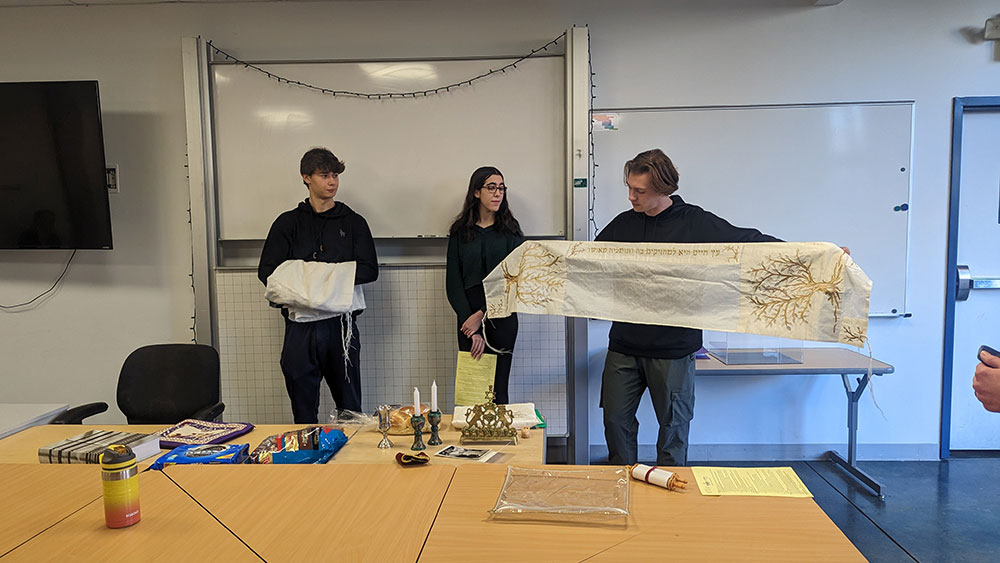So often, what goes on in schools can feel highly regulated. Curriculum frameworks, mandates, and standardized tests dictate so much of the day-to-day rhythm of classroom life. But there are moments of rupture that upend the predictable flow of education. And there is an urgent need for leadership in such moments.
The Hamas-orchestrated attack on Israel on October 7th was a seismic and traumatic disruption. The ongoing war in Gaza is similarly so for the millions of Israelis and Palestinians that are profoundly and irrevocably affected in immeasurable ways. The reverberations of anguish touch the lives of students and communities around the world, including throughout Massachusetts.
Despite thousands of miles of physical separation, countless students walk into classrooms feeling intimately connected to the events unfolding in Israel and Gaza. And they bring with them the psychic toll of these terrorist attacks, war, and crisis. This means that there is an undeniable imperative for educational leaders and teachers to reflect on their values and redouble their efforts to provide social and emotional supports for students, opportunities for meaningful discussion, and an environment that is nurturing and supportive of their questions, thoughts, and feelings.
There’s a concept in education called the teachable moment. Teachable moments are never planned. They are often missed when there is a lack of attentiveness or sensitivity to the potential of the moment. But when they are recognized, educators rise to the occasion and respond with wisdom and compassion. Such teachers turn the unforeseen into lifelong lessons
We are currently living through an undeniable moment of pain and suffering. We are also witnessing a teachable moment, so long as our educators respond with humility, action, clarity, and purpose.
Not every educational leader or teacher has responded this way in recent weeks. The disappointing, infuriating, and troubling examples make for a lengthy list. Still, at a time when too many students, parents, guardians, and community members are feeling unseen, unsafe, isolated, and fearful, we must showcase examples of humane and brave leadership.
If there is not enough inspired and inspiring leadership in this world, we can pave the way for more by acknowledging and celebrating it when we see it.
After a bomb threat was called into Sha’aray Shalom—a synagogue in Hingham—on November 19th, Hingham High School Principal Rick Swanson issued a written communication to the community. It was clear and unwavering in its condemnation of the bomb threat and in the high school’s commitment to promoting a spirit of solidarity, support, and safety for students. Principal Swanson articulated the school’s values of educating to combat bigotry and forge community when writing
The threat against the Jewish temple here in Hingham offers vivid proof of the hatreds and divisions that continue to plague our society, and it represents an affront, not just to those who worship at the temple, but to every one of us. We are all wounded by this senseless act, and our whole school therefore stands in solidarity.
Principal Swanson did not equivocate. His language was not boilerplate. He wrote with conviction and reassured his community in the process. And he also explicitly connected the need to respond to antisemitism with the mission of schooling—cultivating students’ ability and desire to participate in civic life for a greater good:
History shows us that the only effective response to antisemitism, or bigotry of any kind, is the vigilance of citizens, especially young people, who are engaged, informed, and educated.
Principal Swanson stepped in front of his community, ensuring an atmosphere of fear and intimidation was met with a spirit of togetherness, healing, and a shared commitment to educating for a more just, inclusive, and healthy civil society. And Principal Swanson is not alone.
After hearing from Israeli parents who raised concerns over the district’s support for Jewish students, Needham Superintendent Dan Gutekanst entered into dialogue with Rabbi Jay Perlman and Dr. Huma Farid, Jewish and Muslim representatives of the Needham Interfaith Clergy Association. Moreover, the conversation was filmed and shared with the Needham community and the world when uploaded to the district’s YouTube channel.
Superintendent Gutekansk engaged with humility and brought a spirit of inquiry, attentiveness, and solidarity to this interfaith exchange. He willingly conceded that he did not possess all the answers and wished to learn from leading members of Needham’s faith communities so that the district could move forward in the most culturally sensitive and responsible manner.
In education, leadership takes many shapes. Sometimes, it requires decisiveness. Other times, humility. Much of the time, it demands open dialogue with trusted partners. JCRC Greater Boston celebrates the inroads towards healing and repair in Hingham, Needham, and many other districts where we have been in consistent communication over the past many weeks.
Change often requires cooperation. Cooperation is built on trust. Trust begins with a conversation. We at JCRC are motivated and determined to build trusting, sustained, and collaborative partnerships with school districts throughout Greater Boston because this is how the leadership that students need to thrive in safe and supporting schools is made possible.
Tomorrow is another day to fix the brokenness of the world. We at JCRC will continue this work. Educational leaders will continue this work. And it will be our work together. That is the lesson of this teachable moment.




